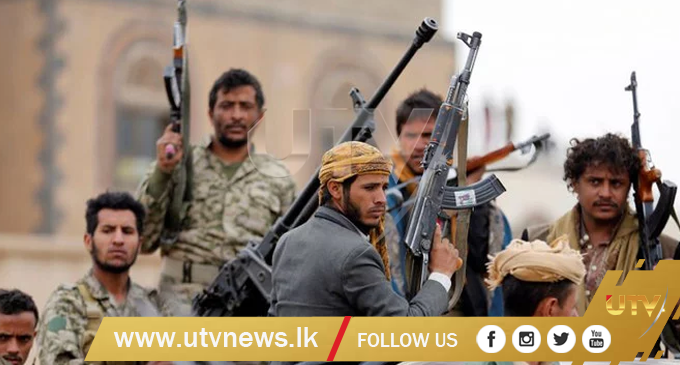UTV | ADEN – The Houthis are touting their ideology at Yemen’s universities and changing the curriculum to promote their own political and religious agenda, according to professors and students at rebel-controlled institutions.
When the Houthis took over Sanaa three years ago, they arrested many of their opponents, some of whom were university professors who fled overseas or to other provinces. It gave the Houthis a chance to infiltrate public and private universities, appoint new professors and introduce fresh courses into the curriculum.
One mandatory course that all first-year university students must attend is “The Arab-Israeli Conflict.” Instead of teaching a core piece of Middle East history as the title suggests, it promotes Houthi ideology and includes teachings by their founder, Hussein Badr Al-Deen Al-Houthi.
The course praises Shiites and glorifies Hezbollah and its leader Hassan Nasrallah for fighting against Israel. It lauds their foreign allies in Iran, Lebanon and Syria.
The course describes Saudi Arabia and other Sunni countries as mercenaries, and portrays the role of the Saudi-led coalition in the Yemen war as “an aggression.” The coalition joined the Yemen conflict in support of the internationally recognized government after the Houthis and their allies seized the capital.
While some Yemenis have rejected the thoughts and beliefs forced on them, few dare to oppose the rebels openly.
“The Houthis impose their beliefs on the university curriculum to reflect the good face of the Shiite to attract new supporters even after so many years, but I think that the students are clever enough to distinguish between right and wrong,” said an anti-Houthi professor from Sanaa University who did not want his name published.
The Iran-backed Houthi militias, which follow the Zaidi branch of Shiite Islam, understand the importance of shaping the minds of the next generation through education, he said, but the professors themselves can do little to stop them.
“We professors cannot oppose them, so we will continue to work under the leadership of the Houthis until the Houthis lose their control on universities,” he told Arab News.
According to the Middle East Institute (MEI), a research institute based in Washington, Iran has expanded its academic and cultural exchange programs inside Yemen, and reportedly used these programs to recruit Yemenis for its political and military training courses, some of which are jointly run with the Lebanese Hezbollah.
“Since the Houthi rebels took over the Yemeni capital of Sanaa three years ago, Iran has stepped up its hard power and soft power efforts to expand its influence in the Arab country,” MEI said in a commentary.
“While Iran’s transfer of weapons and missile technology to Yemen often make international headlines, the Iranian soft power efforts aimed at promoting the Islamic republic’s ideological, revolutionary, cultural and political influence in Yemen are largely overlooked,” it noted.
Yemen’s deputy premier and interior minister, Maj. Gen. Hussein Arab, also said last year that the Houthis were injecting sectarian thought into the curriculum.
Some students from Sanaa University and private universities under Houthi control said that they rejected the new courses.
“The Houthis implemented courses and subjects that praise the Shiites and insult Sunnis either in Yemen or outside Yemen but this is not why we came here to study,” said a first-year accountancy student at Sanaa University, who did not give his name for fear of repercussions.
“They even brought Shiite professors to teach these courses and subjects, which are irrational but no one dares to oppose them because we already know the result of any opposition,” he said.
“The only solution is to pretend that we are very interested in such subjects. Otherwise, we will fail in the examination and no one will help us.”
Others expressed revulsion that their professors were helping the rebels to indoctrinate pupils.
“The disaster is not the Houthis themselves but the professors who teach their doctrines,” said another student. Salah (not his real name) from Sanaa University, said: “I cannot believe that a professor who has spent most of his life learning will finally come to teach us the beliefs of Shiites and sermons of Al-Houthi.”
He said there were some independent professors at Sanaa University but many did not dare to oppose the Houthis and found themselves having to follow the demands of the militias to protect their families and themselves.
“If the independent professors oppose the Houthis, the Houthis definitely will harm them and they may detain them,” he said.
Last year, the militias fired more than 40 professors from Sanaa University under the pretext of absence and appointed professors who were favorable toward the Houthis to replace them.
The United Nations Children’s Fund (UNICEF) warned in March that Yemen’s education system has become another casualty in the conflict, with nearly two million Yemeni children now out of school.
“An entire generation of children in Yemen faces a bleak future because of limited or no access to education. Even those who remain in school are not getting the quality education they need,” said its Yemen representative Meritxell Relano.
More than 2,500 schools are now out of use — with two thirds damaged by attacks, 27 percent shut down and 7 percent used for military purposes or as shelters for the displaced, the aid agency reported.
UNICEF had previously warned that children and youth prevented from going to school due to war were especially vulnerable to foreign exploitation and indoctrination. (Courtesy – Arab News)

